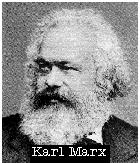The Theory of Class Warfare
 Many social
thinkers throughout history have noted that different groups'
interests conflict. Marx's distinctive contributions were, first,
to paint class conflict as a life-and-death struggle impossible
of peaceful resolution; second, to treat membership in a class
as essentially permanent and hereditary. The combination of these
principles led him to sanction and indeed to urge "total
war" against hated social classes, a war in which all methods
are permissible against anyone with the wrong class background.
Passage after passage in the Marxian corpus hammers home this
brutal message:
Many social
thinkers throughout history have noted that different groups'
interests conflict. Marx's distinctive contributions were, first,
to paint class conflict as a life-and-death struggle impossible
of peaceful resolution; second, to treat membership in a class
as essentially permanent and hereditary. The combination of these
principles led him to sanction and indeed to urge "total
war" against hated social classes, a war in which all methods
are permissible against anyone with the wrong class background.
Passage after passage in the Marxian corpus hammers home this
brutal message:
[T]he antagonism between the proletariat and the bourgeoisie is a struggle of class against class, a struggle carried to its highest expression in a total revolution. Indeed, is it at all surprising that a society founded on the opposition of classes should culminate in a brutal "contradiction," the shock of body against body, as its final denouement?
The Coming Upheaval
Marx makes it quite clear that the class war will not end merely because the proletariat has gained the upper hand.
[S]o long as other classes continue to exist, the capitalist class in particular, the proletariat fights it (for with the coming of the proletariat to power, its enemies will not yet have disappeared, the old organization of society will not yet have disappeared), it must still use a measure of force, hence governmental measures; if it itself still remains a class and the economic conditions on which the class struggle and the existence of classes have not yet disappeared, they must be forcibly removed or transformed, and the process of their transformation must be forcibly accelerated.
After the Revolution
[B]y "individual" you mean no other person than the bourgeois, than the middle-class owner of property. This person must, indeed, be swept out of the way, and made impossible. (Manifesto of the Communist Party) |
It need not be said what will be done to people who do not want to be "transformed."
|
| ||

|
| |
|
|